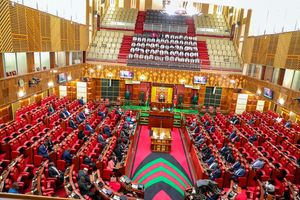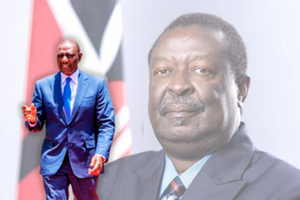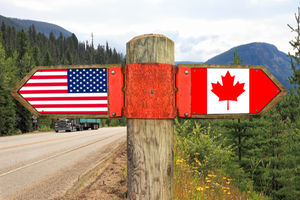
Prime Cabinet Secretary Musalia Mudavadi, after appearing before the Senate Committee on National Security, Defence and Foreign Affairs at the County Hall, Nairobi on Tuesday, April 29, 2025.
Prime Cabinet Secretary Musalia Mudavadi has said appointments to foreign missions will no longer be a dumping ground for election losers, retired politicians and fired State officers.
The Foreign and Diaspora CS disclosed that the ministry is working on a sessional paper that will limit non-career diplomats from dominating appointments to the foreign missions.
Appearing before the Senate Foreign Affairs, Defence and Foreign Relations committee on Tuesday, Mr Mudavadi announced that the government is formulating a sessional paper, a first of its kind, to guide Kenya’s foreign and diaspora policy as well as herald other reforms.
He explained that the policy document, which has already undergone public participation through the National Assembly, will address the issue of diplomatic appointments to give career diplomats an upper hand.
Mr Mudavadi observed that the policy, once operationalised, will establish a ratio where at least 70 percent of foreign mission deployments go to career diplomats who have trained and grown into the system.
The move, he said, will limit non-career diplomats to not more than 30 percent of such appointments going to individuals not in the diplomatic circles.
The Prime CS pointed out that even the non-career diplomats must be experienced individuals as part of an injection of ideas and approaches from the outside world.
“This is a major issue and we have integrated it in the sessional paper to maintain proper professionalism. We don’t want to make foreign affairs a dumping ground but we would like to put our best foot forward in terms of our representation in diplomatic circles,” said Mr Mudavadi.
“This will be our position going forward to guide future nominations or appointments in diplomatic missions,” he added.
National policy
The development comes after nominated Senator Catherine Mumma questioned whether there is a national policy guiding the ratio of appointment of ambassadors between political appointees and career diplomats.
“My question is premised on the fact that international diplomatic relations are a very serious issue, and sometimes, we see more politically appointed ambassadors than career diplomats. So, we want to know whether we have a policy that guides the ratio,” said Ms Mumma.
Nairobi Senator Edwin Sifuna also raised concerns over the deployment of non-career diplomats to foreign missions because of the nature of the engagements needed.
“People are asking whether the people we second to the foreign missions to run our foreign affairs should be the caliber of retired politicians and others, and that our foreign missions have been turned into dumping grounds for non-professional diplomats,” said the ODM Secretary-General.
“What is the government’s position on this and do you think that the men and women we send to the foreign missions are up to the task?” he posed.

Nairobi County Senator Edwin Sifuna during an interview in his office.
Just early this year, President William Ruto nominated non-career diplomats for appointment to positions of High Commissioners, ambassadors, and diplomatic representatives.
They included former ministers Lawrence Karanja as ambassador to Brazil, Ms Margaret Nyambura Ndung’u was nominated for appointment as High Commissioner to Ghana but declined her nomination.
Others were former Sports minister Ababu Namwamba (permanent representative to the United Nations Environment Programme/United Nations Office at Nairobi, and ex-deputy Inspector-General Noor Gabow (consul-general to Port-au-Prince, Haiti).
Other previous appointments have also been dominated by politicians and civil servants not plucked from the diplomatic field.
However, CS Mudavadi explained that the quarter for non-career diplomats is only aimed at infusing knowledge from the external world.
“We should not necessarily be incestuous permanently in this context, but be able to infuse with other people.”
CS Mudavadi added that the policy document will have input from MPs, a departure from the past where foreign and diaspora policy was confined to the Executive.
He revealed that Kenya has never had a sessional paper on her foreign policy and what has been there is largely a document within the Executive.
“But we are saying we cannot continue doing it that way and people’s representatives must have an input. We want to establish a reasonable ratio so that we can have career progression for the diplomats who are working in the diplomatic field,” he said.
At the same time, CS Mudavadi admitted that Kenya is grappling with underfunding of her various diplomatic missions, saying that budgetary flow to the missions have been inadequate to the extent that some officials have been put in embarrassing positions.
To solve the situation, he told the committee that the sessional paper seeks to entrench the foreign affairs docket under the National Security Council framework to help with matters related to budgetary allocation and provisions that will give the ministry more room to strengthen its engagements.
“Constitutionally, matters of foreign affairs are in the national security council. We want to correct this so that future budgeting processes will be within that category to give an opportunity for higher ceilings within the budgetary framework, reducing possibilities of arbitrary budget cuts that impair such foreign missions,” said Mr Mudavadi.
“We must make sure resource allocations to our missions are adequate so that we don’t put them in trouble. This could be a national security risk if diplomatic missions are underfunded because there could be a temptation to leak crucial information for some gain and this could be dangerous.”
The CS was responding to a question from Senator Sifuna over poor staffing in some diplomatic missions with two consulates in Los Angeles and New York the worst hit.








